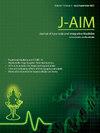瑜伽肠道通气技术抑制幽门螺杆菌诱导的酸性消化性疾病:一项随机对照试验
IF 1.9
Q3 INTEGRATIVE & COMPLEMENTARY MEDICINE
引用次数: 0
摘要
背景:胃酸消化性疾病(APDs)最常见的病因是幽门螺杆菌(h.p ylori)感染。传统上,质子泵抑制剂(PPIs)用于治疗高酸性和消化不良。PPIs的持续使用可导致细菌耐药性、副作用、生活质量差(QoL)和经济负担增加。幽门螺杆菌是微嗜氧菌,可通过肠道通气加以抑制。因此,瑜伽肠道通气技术(YGATs)可能是减轻幽门螺杆菌引起的apd,减少药物剂量和经济负担的潜在选择。目的探讨YGATs对幽门螺杆菌诱导APDs患者胃肠道症状、应激和生活质量的影响。方法对胃脘痛、胃反流、胃灼烧患者进行筛查,内镜下行快速脲酶试验(RUT)确认幽门螺旋杆菌感染。34例RUT阳性患者随机分为两组。瑜伽组(n = 16)在PPI治疗的基础上,接受YGAT治疗2个月零7天。对照组(n = 18)仅给予ppi。采用胃肠症状评定量表(GSRS)、反流和消化不良生活质量问卷(QOLRAD)和应激指标问卷(SIQ)对APD的体征、症状及其合并症(应激和生活质量)进行测量。结果使用第24版IBM-SPSS进行组内和组间比较的Bonferroni调整后分析计算的分裂图方差分析显示,与对照组相比,瑜伽组的胃肠道症状(p<0.001)和压力(p<0.001)显著减少,生活质量(p<0.001)显著改善。结论ygats可作为减轻幽门螺杆菌引起的apd及其心理合并症的一种无害、廉价的替代或附加治疗方法。本文章由计算机程序翻译,如有差异,请以英文原文为准。
Yogic gut aeration techniques to inhibit Helicobacter pylori-induced acid peptic diseases: A pilot randomized controlled trial
Background
The most common cause of acid-peptic diseases (APDs) is Helicobacter Pylori (H. pylori) infection. Conventionally, proton–pump inhibitors (PPIs) are used to manage hyperacidity and dyspepsia. PPIs’ persistent use can lead to bacterial resistance, side effects, poor quality of life (QoL), and increased economic burden. H. pylori, being microaerophilic, can be inhibited by gut aeration. Therefore, yogic gut aeration techniques (YGATs) may be a potential option to mitigate H. pylori-induced APDs and reduce medication doses and economic burden.
Objective
The study aimed to determine the effect of YGATs on gastrointestinal symptoms, stress, and quality of life (QoL) in patients with H. pylori-induced APDs.
Method
Patients with epigastric pain, gastric reflux, and stomach burning were screened and allowed to undergo an endoscopy followed by a rapid urease test (RUT) to confirm H. pylori infection. Thirty-four patients with positive RUT were randomly assigned into two groups. The yoga group (n = 16) received YGAT for two months and seven days in addition to PPI. The control group (n = 18) was provided only PPIs. Signs and symptoms of APD and its co-morbidities (stress and QoL) were measured by using the gastrointestinal symptom rating scale (GSRS), quality of life in reflux and dyspepsia (QOLRAD) questionnaire, and stress indicator questionnaire (SIQ).
Results
Split-plot ANOVA computed with Bonferroni adjusted post hoc analyses for intra and inter-group comparisons using the 24th version of IBM-SPSS showed a significant reduction in gastrointestinal symptoms (p<0.001) and stress (p<0.001) and improvement in QoL (p<0.001) in the yoga group as compared to the control group.
Conclusion
YGATs may be a harmless and inexpensive alternative or add-on therapy to mitigate H. pylori-induced APDs and their psychological co-morbidities.
求助全文
通过发布文献求助,成功后即可免费获取论文全文。
去求助
来源期刊

Journal of Ayurveda and Integrative Medicine
INTEGRATIVE & COMPLEMENTARY MEDICINE-
CiteScore
4.70
自引率
12.50%
发文量
136
审稿时长
30 weeks
 求助内容:
求助内容: 应助结果提醒方式:
应助结果提醒方式:


